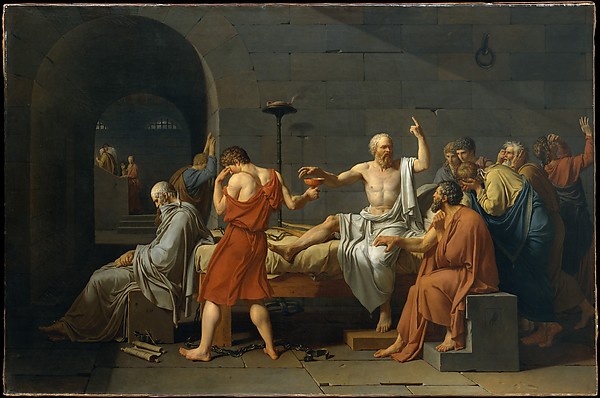The trial scene in The Merchant of Venice, I believe, distinctly mirrors one of Plato’s earlier dialogues, Crito, in regards to initial plotline, character relationships, and the puzzle of civic ethics raised. In Crito, Plato presents a hypothetical dialogue between Socrates, who is in prison awaiting execution, and his friend Crito, who, trying to convince Socrates to escape, offers three justifications for evading the Athenian court’s verdict. In The Merchant of Venice, Bassanio and Antonio’s other friends are akin to Crito, and Antonio, whom Bassanio describes as “one in whom the ancient Roman honor more appears than any that draws breath in Italy” (III.2.306-308), echoes Socrates.
Firstly, Crito does not want to “lose a friend who can never be replaced,” and is willing to sacrifice anything, accepting financial consequences and giving up his loved ones, to save Socrates’ life. Bassanio declares, “My wife, and all the world are not with me esteemed above thy life. I would lose all…to deliver you” (4.I.296). Crito also pleads with Socrates not to desert his sons who need his guidance and protection, paralleling Bassanio’s father-son relationship with Antonio. Secondly, Crito assesses the consequences Socrates’ death will have on him. Socrates’ followers, knowing a bribe in the right hands would save their leader, will assume Crito did not care enough to supply those funds: “I should be thought to value money more than the life of a friend.” In The Merchant of Venice, everyone knows that Bassanio put Antonio is in this fatal circumstance through his request to borrow money. So, Bassanio and Crito face a similar predicament of appearing as if they “value money more than the life of a friend.” Thirdly, Crito argues that by passively accepting execution, Socrates is “betraying [his] own life when [he] might be saved…playing into the hands of [his] enemies and destroyers.” Similarly, Bassanio and Antonio’s friends beg the Duke and Antonio to refuse to consent to Shylock’s legal demand, asking not to give Shylock the satisfaction.
Socrates, on the other hand, understands the unspoken social contract between citizens and their government: the state will be benevolent to those who adhere to the law, and those who do not must accept the legal repercussions. If you accept this deal only when it is in your favor, you “turn your back on the agreements you made as a citizen… breaking the covenants you made…at your leisure, not… under any compulsion or deception.” Similarly, in the trial scene, Antonio “confesses the bond,” meaning he acknowledges that he approached Shylock with this deal, signed and notarized it, fully aware of the risks; Shylock did not trick him into it. Antonio’s identity as a merchant and friend is based on his “credit in Venice” (I.2.187), his “money gratis” loans that ask nothing in return, and his reputation as a man of his word. As Socrates tells Crito, “the principles which I have hitherto honored and revered I still honor,” Antonio feels if he were to deny the “bond” and cheat his way out of it, his identity would shatter and he might as well be dead. Thus, Antonio does not fight Shylock’s fair claim to his flesh: “no lawful means can carry me out of his envy’s reach…I am armed to suffer with a quietness of spirit” (IV.1.13).
Like Crito, Bassanio acknowledges that legally Antonio has no case, so he proposes to get justice for Antonio through illegal means. Bassanio beseeches the Duke, “Wrest once the law to your authority. To do a great right, do a little wrong, and curb [Shylock] of his will.” (IV.1.224-226). But as Antonio realizes, this is an oxymoron; justice can only be exacted through legal means, not around them. Waving one law would discredit the whole body of the Venetian constitution. “The Duke cannot deny the course of law…” for if he does it “will much impeach the justice of his state” (III.3.28-32). Socrates similarly answers to Crito: “Do you imagine that a State can subsist and not be overthrown, in which the decisions of law have no power, but are set aside and overthrown by individuals?” Portia further articulates this point: “’Twill be recorded for a precedent, and many an error by the same example, will rush into the state. It cannot be” (IV.1.229-231).
Despite the uncanny similarities up to this point, Shakespeare then veers away from platonic ethics to resolve the trial. In Crito, Socrates declares, “you begin in error when you suggest that we should regard the opinion of the many about just and unjust, good and evil, honorable and dishonorable.” Socrates, holding to this and his other principles, dies a martyr of civic ethics. While, in The Merchant of Venice, it is the “opinion of the many,” in this case the Christian bias of the judge, jury and lawyers, that undermines Antonio’s legitimate legal agreement with Shylock and grants Antonio reprieve. Portia overthrows the decision of law and their power by subverting the language of Shylock and Antonio’s “merry bond.” If every law was scrutinized this way, the legal system would break down and any criminal with lexical prowess would be exonerated. Shakespeare’s Venetian state essentially sets aside the law for an individual, Antonio, and Shakespeare ends the story before the state must face consequences for the precedent they have set. Socrates argues that doing “evil in return for evil,” which is often the “morality of the many,” is “not just.” The court could have let Shylock go and rejoiced that Antonio got out of harm’s way. But, on top of denying Shylock the rewards from the bond he fairly swore, the Christian “many” go even further and strip Shylock of everything he’s worked for, essentially leaving him to die. In this way, Shakespeare leaves a doubt that Antonio’s exoneration, and Shylock’s demise, may not have been the moral, civically ethical course of action. After all, when “the many” define justice based on prejudice and favoritism, morality rarely prevails.

